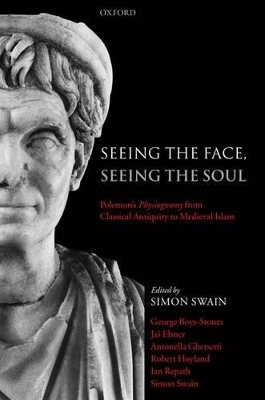
Seeing the Face, Seeing the Soul
Polemon's Physiognomy from Classical Antiquity to Medieval Islam
Seiten
2007
Oxford University Press (Verlag)
978-0-19-929153-3 (ISBN)
Oxford University Press (Verlag)
978-0-19-929153-3 (ISBN)
Polemon of Laodicea's Physiognomy explains how to detect someone's character from their appearance. The original 2nd-century text has been lost, but this collection of essays presents translations of the surviving Greek, Latin, and Arabic versions together with a series of masterly studies on the Physiognomy's origins, function, and legacy.
Polemon of Laodicea (near modern Denizli, south-west Turkey) was a wealthy Greek aristocrat and a key member of the intellectual movement known as the Second Sophistic. Among his works was the Physiognomy, a manual on how to tell character from appearance, thus enabling its readers to choose friends and avoid enemies on sight. Its formula of detailed instruction and personal reminiscence proved so successful that the book was re-edited in the fourth century by Adamantius in Greek, translated and adapted by an unknown Latin author of the same era, and translated in the early Middle Ages into Syriac and Arabic. The surviving versions of Adamantius, Anonymus Latinus, and the Leiden Arabic more than make up for the loss of the original.
The present volume is the work of a team of leading Classicists and Arabists. The main surviving versions in Greek and Latin are translated into English for the first time. The Leiden Arabic translation is authoritatively re-edited and translated, as is a sample of the alternative Arabic Polemon. The texts and translations are introduced by a series of masterly studies that tell the story of the origins, function, and legacy of Polemon's work, a legacy especially rich in Islam. The story of the Physiognomy is the story of how one man's obsession with identifying enemies came to be taken up in the fascinating transmission of Greek thought into Arabic.
Polemon of Laodicea (near modern Denizli, south-west Turkey) was a wealthy Greek aristocrat and a key member of the intellectual movement known as the Second Sophistic. Among his works was the Physiognomy, a manual on how to tell character from appearance, thus enabling its readers to choose friends and avoid enemies on sight. Its formula of detailed instruction and personal reminiscence proved so successful that the book was re-edited in the fourth century by Adamantius in Greek, translated and adapted by an unknown Latin author of the same era, and translated in the early Middle Ages into Syriac and Arabic. The surviving versions of Adamantius, Anonymus Latinus, and the Leiden Arabic more than make up for the loss of the original.
The present volume is the work of a team of leading Classicists and Arabists. The main surviving versions in Greek and Latin are translated into English for the first time. The Leiden Arabic translation is authoritatively re-edited and translated, as is a sample of the alternative Arabic Polemon. The texts and translations are introduced by a series of masterly studies that tell the story of the origins, function, and legacy of Polemon's work, a legacy especially rich in Islam. The story of the Physiognomy is the story of how one man's obsession with identifying enemies came to be taken up in the fascinating transmission of Greek thought into Arabic.
Simon Swain is Professor of Classics at the University of Warwick. George Boys-Stones is Lecturer in Classics, University of Durham. Jas Elsner is Humfry Payne Senior Research Fellow, Corpus Christi College, Oxford. Antonella Ghersetti is Lecturer, Universita Ca' Foscari, Venice. Robert Hoyland is Reader in Arabic and Middle East Studies, School of History, University of St Andrews. Ian Repath is Lecturer in Classics, University of Wales at Lampeter.
I. ANTIQUITY; II. ISLAM; III. TEXTS AND TRANSLATIONS
| Erscheint lt. Verlag | 8.3.2007 |
|---|---|
| Zusatzinfo | 4 figures, 7 halftones |
| Verlagsort | Oxford |
| Sprache | englisch |
| Maße | 165 x 242 mm |
| Gewicht | 1179 g |
| Themenwelt | Sachbuch/Ratgeber ► Gesundheit / Leben / Psychologie ► Esoterik / Spiritualität |
| Geisteswissenschaften ► Sprach- / Literaturwissenschaft ► Anglistik / Amerikanistik | |
| Geisteswissenschaften ► Sprach- / Literaturwissenschaft ► Literaturwissenschaft | |
| ISBN-10 | 0-19-929153-5 / 0199291535 |
| ISBN-13 | 978-0-19-929153-3 / 9780199291533 |
| Zustand | Neuware |
| Haben Sie eine Frage zum Produkt? |
Mehr entdecken
aus dem Bereich
aus dem Bereich
Neue medizinische Fakten zur Nahtoderfahrung
Buch | Softcover (2024)
Patmos Verlag
CHF 34,90
mit einem Geleitwort von Elke Heidenreich
Buch | Hardcover (2024)
Kösel (Verlag)
CHF 41,95


